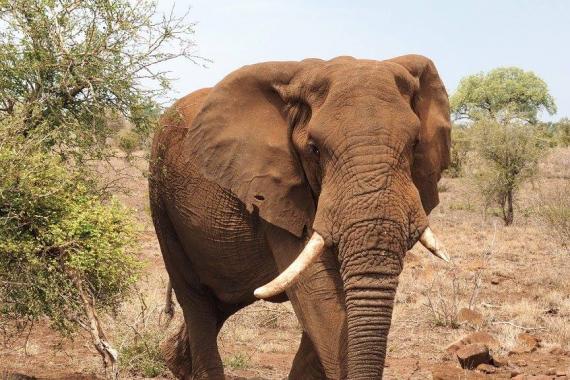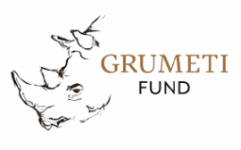Unlocking Prosperous Livelihoods for Tomorrow (UPLIFT)
Current initiative
Published

Elephant in Tanzania.
UPLIFT is a community outreach program led by the Grumeti Fund. The project is designed to enhance the livelihoods of communities along the Grumeti concessions, who suffer from crop raiding elephants as well as adverse climatic changes which impact their livelihoods as they are dependent on agriculture for income. The Grumeti Fund is empowering these communities by providing knowledge, tools and resources.
Location
The Grumeti Fund operates in the western Serengeti in an area referred to as the Ikorongo-Grumeti Game Reserve complex or Singita Grumeti. It is comprised of several different types of protected areas, but managed cohesively by the Grumeti Fund in partnership with the Tanzania Wildlife Management Authority. The area is contiguous with the Serengeti National Park and forms a critical buffer zone to this World Heritage Site.
The poaching and wildlife trade problem
Species affected African Elephant Loxodonta africana , Blue wildebeest Connochaetes taurinus , Zebra Equus quagga , Timber Species
Products in tradeBushmeat, Ivory
Overview of the problem
Poaching in the Western Serengeti is mostly a result of subsistence hunting from local people in the surrounding areas, however sometimes people from outside the area who hope to make financial gains are involved. Often these individuals are accompanied by locals, who are mostly men. The motive behind this illegal offtake is a lack of alternative livelihoods and employment caused by low education levels, which leads to an inability to be employed in formal sectors. Another reason is to do with traditional/cultural needs where wildlife is a major protein source. Poaching can also be driven by retaliation for human wildlife conflict, although this is less common. In addition, trees are often illegally cut down to make charcoal.
The anti-IWT initiative
The UPLIFT project undertakes the following activities:
- Provision of employment, with over 180 people employed
- Supporting enterprise development
- Supporting social services such as building schools and teachers houses
- Provision of alternative fuel sources and gas cookers
- Formation of GHOMACOS (Grumeti Horticultural Marketing Cooperative Society)
Producing vegetables, herbs, meat, eggs and fruits, and trading with Singita Grumeti Reserves, GHOMACOS is now an independent entity with more than 50 members. The minimum pay per month is 65 million Tanzanian shillings and these projects help community members to meet their needs and stop poaching.
- Rural Enterprise Development, Cooperative Society
This is designed to provide livelihood options to the local communities through entrepreneurship skills training so they have support to open new ventures or to grow their business and employ other people.
In 2019, Grumeti partnered with Raizcorp, a South African-based organisation that specialises in business development as part of it's Rural Enterprise Development programme. This involves two key activities: Guiding and Village Learning. Guiding provides intensive one-to-one business support with 11 entrepreneurs participating in 2019, whilst Village Learning programme provides weekly sessions on how to build and develop both business and personal skills.
- Supporting a beekeeping industry, hives and processing centre
- Provision of scholarship opportunities for the youth of 21 villages living adjacent to the Ikorongo Grumeti Game Reserves.
The scholarships provided are for secondary school ordinary level, Advance level, University and vocational training. Each scholarship recipient has a mentor and is given life skills training during as well as internship opportunities.
- Girls empowerment sessions to empower them on the importance of education by staying in schools, and avoiding early marriages and unwanted pregnancies
- English immersion camps for pupils to improve their English skills
- Education support by paying school fees for impoverished families.
Local people, village leaders and district officials are well engaged on all stages of the project and are the key to implementing these strategies.
Inclusion of gender, age and ethnic groups
The Grumeti Fund gives priority to women empowerment on health, confidence and body image. In 2019, 3269 women and girls were engaged in empowerment events.
Secondly, youths are helped in terms of education so that they can bring a positive change to the Western Serengeti society. In our scholarship program we consider both genders equally.
The strategy
Strengthening disincentives for illegal behaviour
There is a total of 132 law enforcement staff, with former poachers employed in anti-poaching units. In addition village game scouts are employed.
Increasing incentives for wildlife stewardship
Establishment of cooperative society that sells vegetables and poultry that goes directly to the communities. Employment opportunities for communities living next to the reserve.
The Singita school of cooking helps to train chefs for the Serengeti tourism sector.
Decreasing the costs of living with wildlife
A rapid response unit aims to respond to HWC before any damage has occurred, with communities able to ring a toll free mobile number to report incidents. Support is given to anti-HWC village groups and a geo tagging system creates alerts when collared animals cross certain boundaries.
It is hoped that elephant collaring and camera traps can provide a better understanding of their movements and prevent HWC.
GF works with communities to raise awareness and resilience toward HWC, using for example film nights.
Increasing livelihoods that are not related to wildlife
Communities have received social services such as water projects, housing for teachers and school facilities, which helps to limit the distance pupils have to travel for education. Nearly 700 LPG sets containing gas stoves and cylinders distributed to households to reduce deforestation.
A Rural Enterprise Development Program also helps to diversify the local economy by training communities on entrepreneurship skills – so far 129 people have graduated from the program.
Communities are supported to build their business capacity, through ventures such as beekeeping.
Build/and or support sense of community ownership or stewardship
Improving education and awareness
Further detailAn Environmental Education Centre provides training on environment and conservation issues, primarily to the youth by encouraging them to become environmental ambassadors in their communities. So far nearly 300 community members and 24 teachers have participated in the environmental awareness program. It is hoped this can change perceptions towards natural resource management and utilisation. In addition, local leaders are trained on the importance of wildlife conservation.
The education support programme awards over 100 scholarships annually to help the youth achieve higher levels of education. The programme also provides mentorship, internships, girls empowerment classes, teacher training, and other activities.
Has the initiative made a difference?
Wildlife monitoring shows an increase in key herbivores, including a four-fold increase in the elephant population and a significant increase in the buffalo population. Carnivores, such as lions and leopards, have also grown in number. Over 100 former poachers have been converted to game scouts, with over 7000 arrests made due to efficient anti-poaching and intelligence initiatives.
Local communities have become environmental ambassadors and their attitude towards wildlife has changed for the positive.
Specific results include:
- Village Learning programme reached 264 entrepreneurs, 64% of them women
- Graduates from the Guiding programme reached 41% growth of business turnover on average, with female participants achieving 10% growth on average
What works and why
Capacity building, awareness campaigns and benefit sharing are all key to effective community engagement. There needs to be win-win outcomes for both conservation and community development. When local communities receive conservation benefits and are involved in conservation, they will support conservation and become part of the initiative.
Law enforcement and anti-poaching efforts are relevant and effective as long as local communities are included in these efforts.
A multi-pronged consortium of methods to reduce IWT should be adopted that is adapted to the local context – this is particularly important for managing HWC.
Factors for success
Sufficient time investment in building relationships and trust between the initiative and local communities
Devolved decision-making power so local communities have a voice in creating or co-creating solutions (as part of the initiative)
What doesn’t work and why
It is important to further strengthen the financial and technical capacity of relevant authorities, and to enhance collaboration between key stakeholders, in order to effectively fight poaching.
Organisers, donors and partners
For further information contact (peoplenotpoaching@gmail.com).
